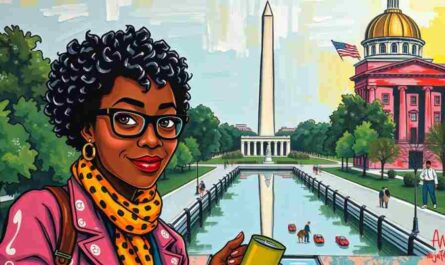West African discovers American distance perception broken by comfort
The Great Distance Delusion
AUSTIN, TX – When Emmanuel Adebayo’s American colleague declined a lunch invitation because the restaurant was “too far,” he assumed it was in another city. It was 2.3 miles awaya distance he used to walk before breakfast in Lagos without thinking twice. “She said it was ‘all the way across town,'” the 30-year-old software developer reported, still processing the audacity. “I looked at the map. It’s a 6-minute drive. In my country, we call that ‘next door.’ Here, it’s apparently a pilgrimage requiring planning and emotional preparation.”
Adebayo walked to school for 13 years in Nigeriathree miles each way, often in rain that made Noah’s flood look like a drizzle. His American coworkers drive 0.4 miles to the gym where they pay $60 monthly to walk on treadmills. “The irony is so thick I could build a house with it,” he observed while watching his neighbor drive to check their mailbox at the end of their driveway.
When Five Minutes Becomes “A Whole Trip”
According to Bureau of Transportation Statistics, the average American considers anything over 10 minutes away “inconvenient”a metric that would make Nigerian commuters laugh until they cried. Adebayo’s daily commute in Lagos was 90 minutes by danfo bus through traffic that made Atlanta look like a ghost town. “Here, people complain about 15-minute commutes,” he said, bewildered. “I once spent 3 hours in Lagos traffic to travel 8 miles. That wasn’t farthat was Tuesday.”
Jim Gaffigan said, “I don’t know what’s worse: my kids whining about being hungry or my kids whining about not being hungry.” Adebayo doesn’t know what’s worse: Americans calling 10 minutes “far” or Americans driving 2 blocks to avoid 4 minutes of walking. Both options suggest a relationship with distance that’s been fundamentally broken by air conditioning and drive-thrus.
The Grocery Store That’s “Too Far to Walk To”
Adebayo lives 0.8 miles from a grocery storea 15-minute walk he does weekly. His neighbors, however, exclusively drive there and look at him like he’s training for the Olympics every time they see him walking home with bags. “One lady offered me a ride because she thought I was homeless,” he recalled. “I was literally walking from the store holding shopping bags like a normal human. But apparently, walking with groceries is a sign of poverty here, not just… having legs and using them.”
Dave Chappelle said, “I’m not a pessimist, I’m an optimist with experience.” Adebayo’s not a pessimist eitherhe’s an immigrant with perspective who finds it hilarious that Americans invented “meal prep delivery services” for groceries instead of just walking to the store like humans did for millennia. His neighbor pays $15 monthly for grocery delivery from a store she could see from her window if she opened her blinds.
The confusion peaked when Adebayo suggested walking to a colleague’s birthday dinner at a restaurant 1.2 miles away. His coworkers stared at him like he’d suggested swimming there naked. “But what about parking?” someone asked. “Parking?” Adebayo repeated slowly. “I have feet. Feet don’t need parking. They just… stop walking when you arrive. It’s revolutionary technology called ‘legs.'”
When Americans Discover Distance Is Relative
What Americans call “far,” Adebayo calls “walking distance.” What Americans call “walking distance,” Adebayo calls “next door.” What Americans call “next door,” Adebayo calls “in the same room.” The disconnect is so severe that his American girlfriend once described a store as “really closeonly 8 minutes away.” He walked there in 11 minutes. She was shocked it was “walkable.”
Chris Rock said, “You can’t have no happiness without no pain.” Americans can’t have convenience without completely forgetting what distance actually is. Adebayo once watched a man drive his car from one side of a parking lot to the other sideapproximately 150 feetbecause “it was hot outside.” The walk would have taken 90 seconds. The drive took 4 minutes including parking. Nobody saw the problem.
The University Campus That’s “Huge” But Actually Tiny
His American friends constantly complain about their “huge” college campus that takes “forever to walk across.” Adebayo visited. It’s 0.6 miles end-to-end. “In Lagos, this would be considered a small building,” he reported. “You people have electric scooters to cross what I would call a courtyard. Your definition of ‘huge’ is my definition of ‘reasonably compact.'”
Bill Burr said, “I’m not going to apologize for being right.” Adebayo’s not apologizing for having walked actual distances. His elementary school in Lagos was 3 miles from homehe walked it twice daily for years. His American coworkers drive their kids 0.5 miles to school and complain about the “long drive.” Their kids will grow up thinking a mile is a unit of time, not distance.
The most American moment came when someone asked Adebayo how he “survives” without a car. He lives in a walkable neighborhood with everything he needs within a mile. “Survive?” he repeated. “I’m thriving. I save $400 monthly on car payments, $100 on insurance, $150 on gas, and $0 on gym memberships because I walk everywhere. You’re not survivingyou’re spending $650 monthly to sit in traffic going places you could walk to faster.”
When Convenience Becomes Inconvenient
Adebayo calculated that his coworker Michelle spends 45 minutes daily driving to and from worka distance of 6 miles through traffic. He bikes it in 28 minutes door-to-door. When he suggested she bike, Michelle said, “But that’s so far.” The distance that’s “too far” to bike is apparently perfect for sitting in traffic burning money and complaining about gas prices.
Amy Schumer said, “I’m not saying I’m lazy, I’m saying I’m energy efficient.” Americans aren’t energy efficientthey’re distance-confused. They’ll drive 30 minutes to a restaurant but won’t walk 10 minutes to one closer because the walking one “feels farther.” Adebayo’s theory: “Your brains have been rewired by cars. Distance isn’t measured in miles anymoreit’s measured in comfort. If you can’t do it in air conditioning while sitting, it’s ‘too far.'”
The Friend Who Lives “All The Way” Across Town
Last month, Adebayo tried to organize a meetup at a bar centrally located to his friend group. Three people said it was “too far” from their apartments. The distances? 2.1 miles, 1.8 miles, and 3.4 miles. “In Lagos, we wouldn’t even consider those distances,” he explained. “That’s not ‘across town’that’s still your neighborhood. My grandmother walks farther than that to church every Sunday. She’s 71 and doesn’t own a car. You’re 28 and acting like 2 miles requires a passport.”
Kevin Hart said, “Everybody wants to be famous, but nobody wants to do the work.” Everybody wants to be healthy, but nobody wants to walk 10 minutes to dinner. Adebayo’s friend group eventually met at a restaurant 0.6 miles from everyone because it was the only distance all five could agree wasn’t “far.” They all drove. He walked. He arrived first.
His American roommate once asked how Adebayo “deals with” not having a car. “I walk places,” Adebayo explained. “But isn’t that exhausting?” his roommate asked while scrolling through Instagram fitness influencers talking about the importance of daily steps. The irony was not lost on Adebayo, who walks 8,000 steps daily just living his life while his roommate drives everywhere then pays for a step-counting app to feel guilty about sitting.
When Geography Becomes Relative to Comfort
The final straw came when Adebayo’s date canceled because the restaurant was “on the other side of town”4.2 miles away. In Lagos, Adebayo regularly traveled 12 miles to see friends. “Four miles is nothing,” he protested. “That’s not distancethat’s a rounding error.” But in America, 4 miles might as well be another country if it requires leaving your immediate comfort zone.
Trevor Noah said, “In Africa, we don’t have the luxury of being picky.” Americans have the luxury of redefining “far” to mean “mildly inconvenient.” Adebayo’s not saying Americans are spoiledactually, yes he is. “You people think a 10-minute drive is ‘far’ while eating food delivered from 30 minutes away. Your understanding of distance only applies when it requires your own effort. If someone else does the driving, suddenly distances don’t matter.”
When asked if he’ll ever buy a car and join American distance perception, Adebayo laughed while lacing up his walking shoes to go somewhere 1.5 miles away that his neighbors consider “basically in another state.” “Why would I?” he asked. “I’m saving thousands yearly, staying healthy, and actually experiencing the city instead of just seeing it through windshields. Also, I’ve learned that Americans’ biggest problem isn’t distanceit’s their relationship with comfort. Everything farther than your couch is ‘too far’ until you realize sitting in traffic for 20 minutes to go 3 miles is fartherin time, money, and sanitythan just walking. But nobody wants to hear that truth while they’re paying $4.50 for gas they’ll burn sitting in traffic to go somewhere they could’ve walked to in less time.”
He paused, then added: “Back home, we walked 3 miles before breakfast without thinking about it. Here, people drive 3 blocks and call it ‘errands.’ The real journey isn’t the distanceit’s convincing Americans that their legs still work.”
SOURCE: Bohiney Magazine (Aisha Muharrar)
DATE: 11/8/2025

 by
by 

